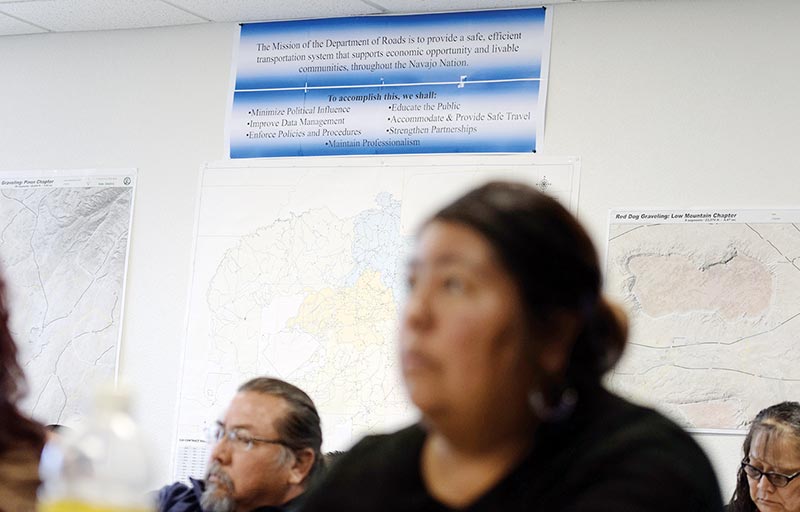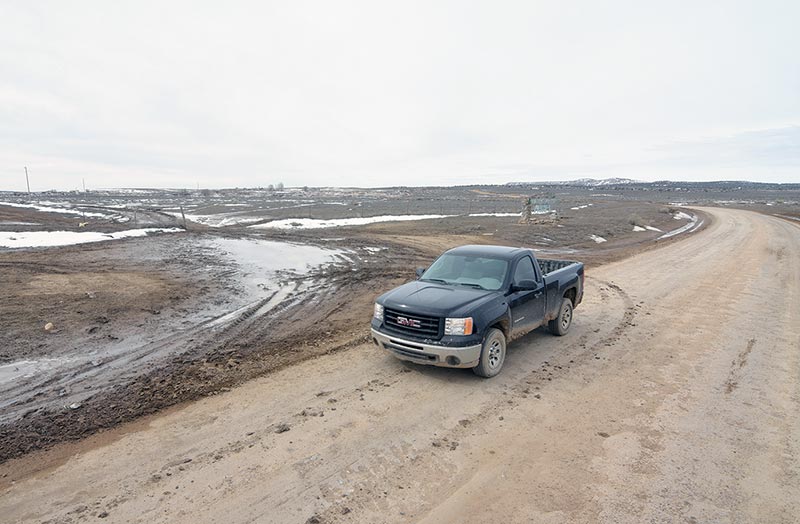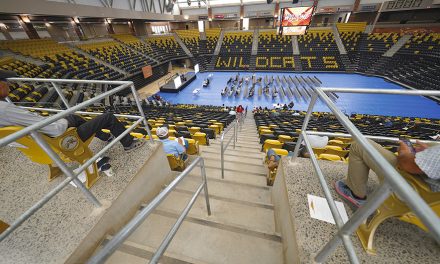
Begaye vetoes disaster relief funds

Navajo Times | Donovan Quintero Officials affiliated with the winter weather emergency listen to updates given to them by various departments and offices Friday at the Navajo Department of Transportation building in Pinon, Arizona.

Navajo Times | Donovan Quintero
A local commuter from the Pinon, Arizona area drives along a mostly dry and rough Route 4 Friday.
WINDOW ROCK
Navajo Nation President Russell Begaye has line-item vetoed $242,576 appropriated by the Navajo Nation Council to go toward Navajo Nation chapters for disaster relief services.
With the recent snowstorms that had hit the Navajo Nation two weeks ago during Navajo Nation Council Winter Session the legislation listed 33 chapters to receive between $469.00 to $10,000 each from the minimum fund balance of the Unreserved, Undesignated Fund balance.
In Begaye’s line-item veto he stated the reason for his decision was that the resolution did not comply with the Navajo Nation Code. According to Navajo Nation Code it is required that the Minimum Fund Balance be maintained at no less than 10 percent of the Nation’s General Fund Operating Budget. The Attorney General cannot waive this stipulation and any distribution to chapters must be based on the 50/50 requirements.
“There are chapters on this list that have not declared a State of Emergency,” Begaye stated in his justification. “It is unclear how the list was developed.”
In response to the veto, Speaker LoRenzo Bates stated the actions of the Council were in response to calls for help that came from individual Navajo people and chapters, and despite Begaye’s claim that not all chapters declared an emergency, the Navajo Nation Commission on Emergency Management did declare an emergency on Jan. 23 for the entire Navajo Nation that was concurred and signed by Begaye and Vice President Jonathan Nez, according to a news release.

Navajo Times | Donovan Quintero
Officials affiliated with the winter weather emergency listen to updates given to them by various departments and offices Friday at the Navajo Department of Transportation building in Pinon, Arizona.
The Department of Justice claims that the resolution passed by the Council is not in compliance with the Navajo Nation Code. The DOJ states that the Council cannot waive certain provisions pertaining to the Minimum Fund Balance and that doing so would violate the law. Office of Management and Budget adds that the emergency funds are not equally divided among all the Chapters as required by the Navajo Nation Code. Bates said the advice provided to the president is incorrect.
Bates pointed out that Begaye signed into law a separate and nearly identical resolution that contained the exact same waiver language pertaining to the Minimum Fund Balance. The resolution passed by Council, CJA-02-17, provided approximately $5 million in funding for General Assistance and Welfare Services to benefit Navajo families after the Division of Social Services failed to secure federal funding.
“President Begaye is clearly showing a lack of consistency in applying his interpretation of the laws of the Navajo Nation,” stated Bates. “If President Begaye believes that this recent resolution violates the law then he himself violated the law on January 17 when he approved a nearly identical resolution. The President cannot pick and choose when he wants to apply his interpretations of our laws.”
Nez, as well as other entities, gave updates during a Feb. 3 Black Mesa Region declaration of emergency update meeting. The chapters that were in attendance were Black Mesa, Blue Gap-Tachee, Forest Lake, Hard Rock, Low Mountain, Piñon and Whippoorwill; Piñon was the only chapter from this list that would’ve received funds — $6,061.93 to be exact — from the resolution. A similar meeting was held in Crystal, New Mexico.
“Getting everyone on the same page is the goal,” said Nez. This was the second meeting; during the first meeting he said he was given a recommendation to contact Peabody Coal to get more coal for the communities, especially for the elders and high-risk individuals. He also requested gravel, but they are waiting for the go-ahead in order to receive it.
Nez emphasized the need for chapters to capture and document the funds they are spending during this time of declaration of emergency in order to receive reimbursement from the Federal Emergency Management. The threshold, which was at $1 million, is now at $250,000 in order to be eligible for reimbursement.
“If we can get legitimate documentation for reimbursement we’ll begin to get some of those dollars back through the Nation, and then back to the chapters,” said Nez.
To read the full article, pick up your copy of the Navajo Times at your nearest newsstand Thursday mornings!
Are you a digital subscriber? Read the most recent three weeks of stories by logging in to your online account.







 Highway 264,
Highway 264, I-40, WB @ Winslow
I-40, WB @ Winslow